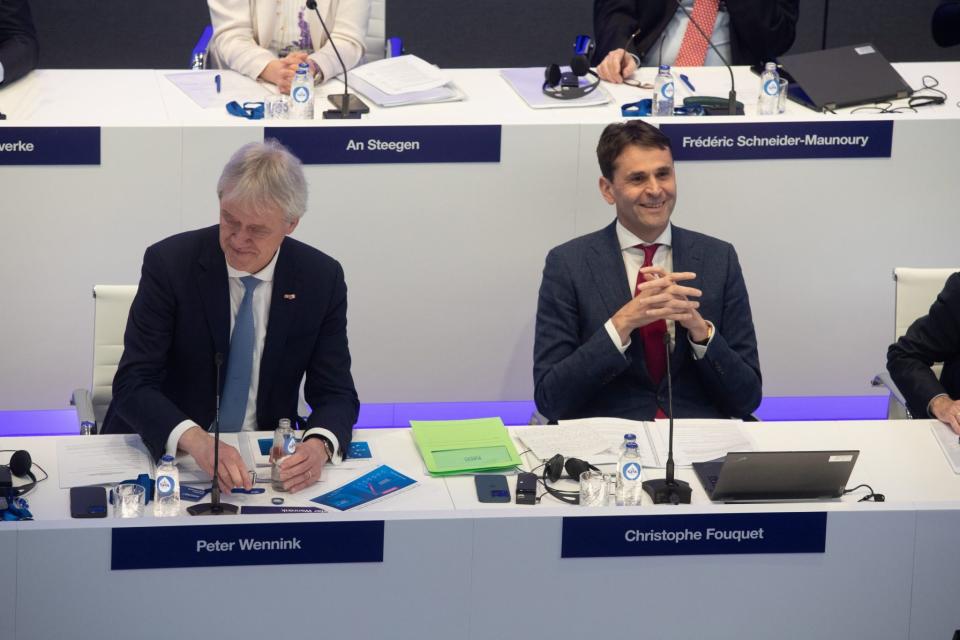China is still a decade behind the U.S. in chip technology—but the world still needs the mature chips it’s making, says ASML’s CEO

"Overcapacity" is the recent buzzword from Western governments trying to criticize China's manufacturing policies, arguing that China is producing more than it can consume, and dumping the surplus in foreign markets. Officials apply the term to Chinese EVs, solar panels, and increasingly the "mature" chips used in everything from cars to consumer electronics.
Christophe Fouquet, the CEO of Dutch semiconductor company ASML, has a different view. In an interview with German business outlet Handelsblatt, published Monday, Fouquet argued the world needs the legacy chips coming out of China. Demand for these components is rising, but chipmakers are loath to expand production due to their slim margins.
Europe can't cover half the chip it needs, Fouquet said. “There is no point in stopping someone from producing something you need. With Russian gas, people have understood that alternatives must be found, but not yet with chips,” he said.
Economies like Germany, the U.S. and Japan are offering subsidies to attract chipmakers to set up domestic operations. Yet China is overtaking them all: The country will have 18 chip projects starting operations this year for mature chips, more than any other country, according to the U.S. industry group SEMI.
In response to a question about further export restrictions, Fouquet said governments worried about China needed to build their own factories. "It's not acceptable to make manufacturing more difficult for China and not create alternatives ourselves," he said.
Subsidies may help attract some non-Chinese chipmakers to set up a local or regional supply chain. But analysts warn that legacy chip programs may not be economically sustainable due to lower margins in the industry.
Fouquet estimated that China is currently a decade behind the U.S. in chip technology. ASML is barred from selling its most advanced machinery to China, and even its less-advanced tools are now in Washington's crosshairs.
U.S. chip controls may be pushing Chinese companies to be more active in the legacy chip sector, analysts previously told Fortune. Chinese chipmakers could be trying to insulate themselves from further sanctions, but they may also see less advanced chip production as a stepping stone to move up the value chain and replace Western technology.
Yet Fouquet, in his interview with Handelsblatt, thinks China will struggle to recreate ASML's extreme ultraviolet lithography machines, currently the only way to make the most cutting-edge chips. (ASML is the only producer of EUV machines).
'Friend of China'
Fouquet's predecessor Peter Wennink took to Dutch radio over the weekend to blast the current U.S.-China chip war as an exercise in "ideology."
Wennink noted that ASML had to navigate a tightrope between the U.S. and China. ASML wanted to be able to keep selling to China, a major market, so Wennink had to lobby Western governments against tight export restrictions. Yet Wennink said he also had to complain to high-ranking Chinese politicians in order to protect ASML's intellectual property.
The former ASML CEO complained this juggling act led to Washington officials deeming him a "friend" of China.
"I'm a friend to my customers, to my suppliers, to my employees, to my shareholders," he said.
China was ASML's second-largest market last year, making up a quarter of its total sales. Yet Washington is reportedly pressuring the Netherlands and Japan to expand export controls on Chinese companies, which could affect ASML's business.
Wennink, who retired earlier this year after a decade running ASML, complained that geopolitics was making it harder to operate in China. "These kind of discussions are not being conducted on the basis of facts or content or numbers or data but on the basis of ideology," he said.
This story was originally featured on Fortune.com

 雅虎香港財經
雅虎香港財經 